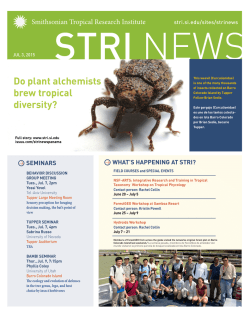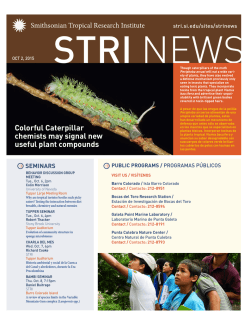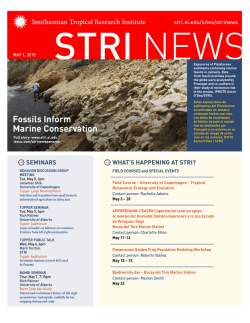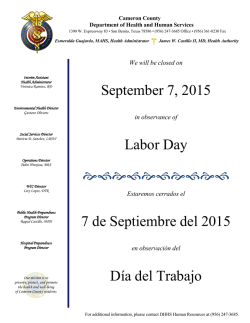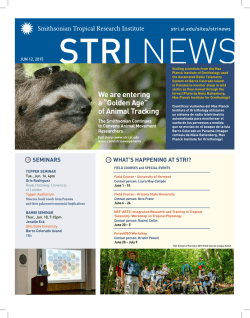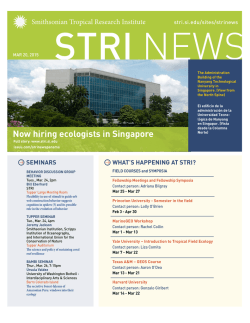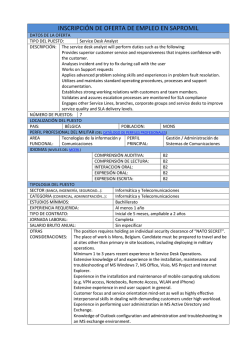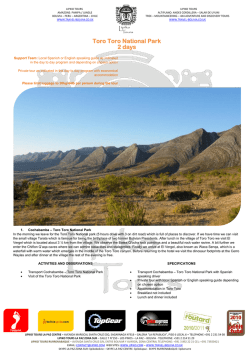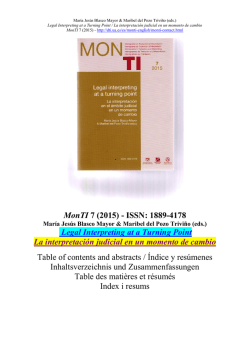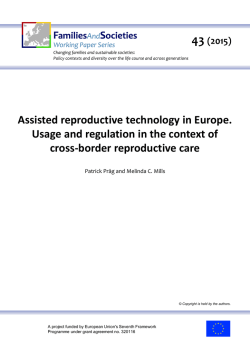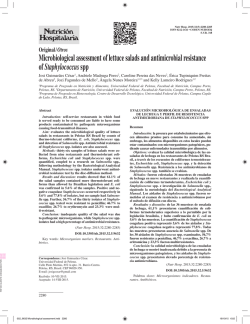
August 07, 2015
stri.si.edu/sites/strinews AUG 7, 2015 Sweat bee Megalopta genalis (Photo by Ajay Narendra) Abeja del sudor Megalopta genalis (Foto por Ajay Narendra) Beeline flights through the dark Full story: www.stri.si.edu issuu.com/strinewspanama SEMINARS BEHAVIOR DISCUSSION GROUP MEETING Tue., Aug. 11, 2pm Aafke Oldenbeuving University of Amsterdam Tupper Large Meeting Room Pollinator attraction in figs – How to make sense of their scents TUPPER SEMINAR Tue., Aug. 11, 4pm Chris Jiggins Cambridge, St John’s College Tupper Auditorium The genetic origins for novel butterfly wing patterns BAMBI SEMINAR Thu., Aug. 13, 7:15pm Jane Lucas Barro Colorado Island TBA WHAT’S HAPPENING AT STRI? FIELD COURSES and SPECIAL EVENTS University of California, Riverside Tropical Ecology field course 26JULY-22AUG Contact person: Louis Santiago Golden Frog Festival August 14 - 30 Contact person: Jimena Pity Heliconius among us Heliconius entre nosotros STRI staff scientist Owen McMillan hosted 55 experts on El científico del Smithsonian Owen McMillan recibió a 55 Heliconius butterflies for the research network’s annual expertos en mariposas Heliconius durante la reunión anual meeting, held this year in Panama. Participants hailed de la red de investigación, celebrada este año en Panamá. from a dozen countries, and included undergrads, pred- Los participantes provenían de una docena de países, e in- ocs, postdocs and principal investigators. The Heliconius cluyó a estudiantes de licenciatura, estudiante de doctorado, genus includes 43 species and hundreds of distinct geo- investigadores de post doctorado e investigadores princi- graphic forms that are found throughout the Americas. pales. El género Heliconius incluye 43 especies y cientos Advances in genetic sequencing of species was a center- de formas geográficas distintas que se encuentran en todo piece of the meeting. “The workshop has two goals,” said el continente americano. Los avances en la secuenciación McMillan. “To bring everyone up-to-date on research and genética de las especies fue una pieza central de la reunión. to find ways we can leverage the research community and “El taller tiene dos objetivos”, comentó McMillan. “Poner the Heliconius system to stay at the forefront of evolution- a todos al tanto de la investigación y encontrar maneras en ary model systems.” que podemos aprovechar la comunidad de investigación y que el sistema de Heliconius permanezca a la vanguardia en sistemas de modelos evolutivos.” How good R your statistics? ¿Qué tan buenas son tus estadísticas? STRI’s Office of Academic Programs held a workshop on La Oficina de Programas Académicos del Smithsonian the programming language R at the Gamboa Schoolhouse celebró un taller sobre el lenguaje de programación R en la and the Tupper Exhibition Hall. Some 30 STRI interns, Escuela de Gamboa y la Sala de Exhibiciones en el Centro fellows, and even a few staff scientists participated in the Tupper. Unos 30 pasantes, becarios y algunos científicos two-day course on the popular data analysis tool. The participaron en el curso de dos días sobre la popular her- course was taught by Andy Jones, an assistant professor at ramienta de análisis de datos. El curso fue impartido por Oregon State University, and Justin Touchon, an assistant Andy Jones, profesor asistente en la Universidad Estatal de professor at Vassar College. For information on upcoming Oregon, y Justin Touchon, profesor asistente en el Vassar workshops, direct enquiries to [email protected]. College. Para obtener más información sobre los próximos talleres, escribir a [email protected]. DEPARTURES ARRIVALS Brandon Guell University of California - San Diego Development, behavior, and adaptive plasticity at life history switch points Gamboa and Tupper Clare Fieseler University of North Carolina Does competition mediate the beneficial value of coral thermal acclimation? Bocas Del Toro Luisa Hosse University of Potsdam Ecosystem Services in the Panama Canal Watershed Agua Salud Ben Hirsch University of Florida Food for thought: Does “smart foraging” explain how primates can afford big brains? Barro Colorado Island Gamboa and Naos Klara Scharnagl Michigan State University Patterns of alpha diversity and biotic interactions from tropical to temperate forests: Using lichens to investigate the latitudinal diversity gradient Barro Colorado Island Diana Hsueh and Wade McGillis Columbia University Tyler Smith and Viktor Brandtneris University of the Virgin Islands Peggy Fong University of California - Los Angeles Ana Palacio University of Miami Are Eastern Tropical Pacific reefs becoming more resilient to ENSO? Naos and Panama Esteban Guerra To Isla Colon, Bocas Del Toro To support the Bocas Del Toro Station with the Nature Fair Ana Endara To Isla Colon, Bocas Del Toro For scientific diving course at Bocas Station Helene Muller-Landau To Baltimore, MD To attend the NGEE-Tropics all-hands meeting and the 100th Annual meeting of the Ecological Society of America Hector Guzman and Carlos Guevara To Isla Coiba (Veraguas) To monitor and tag whales and sharks Stuart Davies and Matteo Detto To Baltimore, MD To attend the 2015 Ecological Society of America (ESA) Annual Meeting Raul De León To Isla Colon, Bocas Del Toro For equipment maintenance, compressor service, scientific diving course Carlos Jaramillo To Espinar, Peru To perform biostratigraphic, sedimentological and backgrounds studies Nathalia Rincón Pontificia Universidad Javeriana Genomic Cross Talk: Comparing the genomic interactions between a plant host (Theobroma cacao) and a fungal endophyte mutualist with those of closely and distantly related pathogens Saskia Santamaria and Jacob Slusser To Azuero Peninsula To visit research/training sites and provide leadership Program follow-up Sean Mattson To Bocas Del Toro For dive training and research PUBLICATIONS Maas, B., Karp, D. S., Bumrungsri, S., Darras, K., Gonthier, D., Huang, J. C. C., Lindell, C. A., Maine, J. J., Mestre, L., Michel, N. L., Morrison, E. B., Perfecto, I., Philpott, S. M., Sekercioglu, Ç. H., Silva, R. M., Taylor, P. J., Tscharntke, T., Van Bael, S. A., Whelan, C. J. and Williams-Guillén, K. 2015. Bird and bat predation services in tropical forests and agroforestry landscapes. Biological Reviews, doi:10.1111/brv.12211 Rossman, A. Y., Adams, G. C., Cannon, P. F., Castlebury, L. A., Crous, Pe. W., Gryzenhout, M., Jaklitsch, W. M., Mejia, L. C., Stoykov, D., Udayanga, D., Voglmayr, H. and Walker, D. M. 2015. Recommendations of generic names in Diaporthales competing for protection or use. IMA fungus, 6(1): 145-154. doi:10.5598/imafungus.2015.06.01.09 Waring, B. G., Álvarez-Cansino, L., Barry, K. E., Becklund, K. K., Dale, S., Gei, M. G., Keller, A. B., Lopez, O. R., Markesteijn, L., Mangan, S., Riggs, C. E., Rodríguez-Ronderos, M. E., Segnitz, R. M., Schnitzer, S. A. and Powers, J. S. 2015. Pervasive and strong effects of plants on soil chemistry: a meta-analysis of individual plant ‘Zinke’ effects. Proceedings of the Royal Society B: Biological Sciences, 282(1812) doi:10.1098/rspb.2015.1001 Baldwin, C. C. and Robertson, D. R. 2015. A new, mesophotic Coryphopterus goby (Teleostei, Gobiidae) from the southern Caribbean, with comments on relationships and depth distributions within the genus. Zookeys, 513: 123142.doi:10.3897/zookeys.513.9998 Brown, G. P., Kelehear, C., Shilton, C. M., Phillips, B. L. and Shine, R. 2015. Stress and immunity at the invasion front: a comparison across cane toad (Rhinella marina) populations. Biological Journal of the Linnean Society,doi:10.1111/bij.12623 Ceron-Souza, I., Gonzalez, E. G., Schwarzbach, A. E., Salas-Leiva, D., Rivera-Ocasio, E., Toro-Perea, N., Bermingham, E. and McMillan, W. O. 2015. Contrasting demographic history and gene flow patterns of two mangrove species on either side of the Central American Isthmus. Ecology and Evolution, doi:10.1002/ece3.1569 Chase, J. M., Powell, K. I. and Knight, T. M. 2015. ‘Bigger data’ on scaledependent effects of invasive species on biodiversity cannot overcome confounded analyses: a comment on Stohlgren & Rejmánek (2014). Biology Letters, 11(8): 20150103doi:10.1098/ rsbl.2015.0103 Condit, R. S. 2015. Extracting Environmental Benefits from a New Canal in Nicaragua: Lessons from Panama. PLoS Biology, 13(7): e1002208 doi:10.1371/journal.pbio.1002208 Heim, O., Treitler, J. T., Tschapka, M., Knornschild, M. and Jung, K. 2015. The Importance of Landscape Elements for Bat Activity and Species Richness in Agricultural Areas. Plos One, 10(7): e013443 doi:10.1371/journal. pone.0134443 Pinto-Sanchez, N., Calderon-Espinosa, M., Miralles, A., Crawford, A. and Ramirez-Pinilla, M. 2015. Molecular phylogenetics and biogeography of the Neotropical skink genus Mabuya Fitzinger (Squamata: Scincidae) with emphasis on Colombian populations. Molecular phylogenetics and evolution, doi:10.1016/j.ympev.2015.07.016 Roberts, T. R. 2015. Mimicry of a Bean Seed by the Amazonian Aspredinid Catfish Amaralia hypsiura (Kner 1855), with Notes on Vegetative Camouflage by Fishes. aqua: International Journal of Ichthyology, 21(3): 120-127. Lim, Y. A., Kida, H., Miyaji, M., Kusumoto, I. T., Miyashiro, H., Hattori, M., Shimotohno, K., Gupta, M. P. and Correa A., M. D. 1997. Inhibitory effects of some Panamanian plants on human immunodeficiency viral reverse transcriptase and protease. Journal of Traditional Medicines, 14: 54-58.
© Copyright 2026
